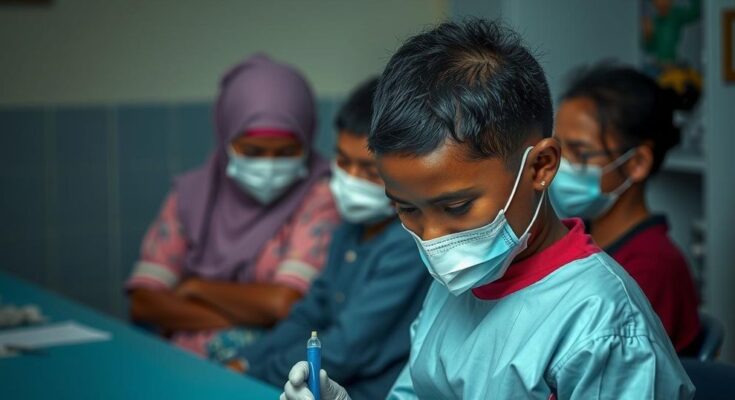Disease X, a potentially undiagnosed illness, is spreading in the Democratic Republic of Congo, particularly in the Panzi district. The outbreak has resulted in 406 cases and 31 deaths, mainly among malnourished children. Experts suggest the disease may be linked to known infections like malaria or pneumonia. The Africa CDC is collaborating with local health officials to investigate potential causes, though challenges persist due to the area’s remoteness.
A mysterious illness, referred to as Disease X, is currently affecting the Democratic Republic of the Congo (DRC), particularly in the remote Panzi district of Kwango province, approximately 700 kilometers from Kinshasa. With 406 reported cases, including 31 deaths predominantly among malnourished children, local health infrastructure is inadequate to address the crisis. Health officials and experts have yet to determine whether the illness is viral or bacterial, despite its flu-like symptoms. Current speculations point towards the likely identification of a known disease.
Epidemiologist Paul Hunter from the University of East Anglia noted, “Reports of outbreaks with fatalities crop up somewhere in the world several times a year. Almost all turn out to be an already well-known infection with limited global consequences.” Further investigation suggests that possible causes include pneumonia, influenza, and malaria, among others. The WHO is cautiously optimistic that the undiagnosed disease will align with previously identified pathogens.
Jake Dunning, an infectious disease specialist from the University of Oxford, expressed concern over the terminology surrounding the outbreak, stating, “Disease X should only really be used when there is an infectious disease with epidemic or pandemic potential and a novel pathogen has been identified or is strongly suspected.” He advised the situation be categorized as an undiagnosed morbidity and mortality event rather than a novel outbreak.
The Africa Centres for Disease Control and Prevention have mobilized a team to collaborate with local health authorities, and laboratory tests are already in progress to ascertain the disease’s origin. However, logistical challenges due to the area’s remoteness have hindered timely assistance. Dunning pointed out that “the DRC has some great clinicians, scientists, and laboratories… but the DRC is a huge country and arguably remains resource-limited.
Local authorities, led by Deputy Governor Remy Saki, have implemented measures to control the situation by monitoring movement in and out of villages and encouraging the public to wear face masks. International healthcare teams continue to explore transmission dynamics and seek to identify further cases, emphasizing the urgency of the response in preventing wider contagion.
Disease X refers to an unidentified illness that is currently being monitored in the DRC, raising concerns due to the high number of cases and fatalities among vulnerable populations. The DRC’s remote geography complicates health interventions, as local facilities lack access to advanced testing capabilities necessary for identifying less common pathogens. Existing infrastructure is currently stretched to address this sudden health crisis while maintaining patient care for known diseases that are endemic in the region.
The ongoing situation in the DRC highlights the complexities involved in dealing with unidentified disease outbreaks, particularly in remote regions with limited healthcare infrastructure. While initial assessments point towards the likelihood of the disease being a known pathogen, further laboratory testing and investigations are essential for a definitive diagnosis. Collaboration between local and international health authorities will be crucial to controlling the spread and mitigating impacts on the affected communities.
Original Source: www.dw.com




